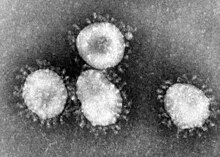Coronavirinae
| Coronavirus | |
|---|---|
 |
|
| Virus classification | |
| Group: | Group IV ((+)ssRNA) |
| Order: | Nidovirales |
| Family: | Coronaviridae |
| Subfamily: | Coronavirinae |
| Genus: | |
| Type species | |
|
Coronavirus |
|
| Species | |
|
Human coronavirus HKU1 |
|
Human coronavirus HKU1
Human coronavirus OC43
MERS-CoV
SARS-CoV
Pipistrellus Bat coronavirus HKU5
Coronavirinae is one of two subfamilies in the family Coronaviridae. It is subdivided into the genera alphacoronavirus, betacoronavirus, gammacoronavirus, and deltacoronavirus. These include phylogenetically compact genogroups of enveloped, positive-sense, single-stranded RNA and with a nucleocapsid of helical symmetry. The genomic size of coronaviruses ranges from approximately 26 to 32 kilobases, extraordinarily large for an RNA virus. Their numbers are growing rapidly with several novel coronaviruses being recently discovered including Middle East respiratory syndrome coronavirus MERS-CoV discovered in 2012.
The genus alphacoronavirus (formerly known as Coronavirus group 1 (CoV-1)) includes subgroups 1a and 1b, which are prototyped by human coronavirus 229E (HCoV-229E) and HCoV-NL63, as well as the newly established species alphacoronavirus 1 (including porcine transmissible gastroenteritis virus [TGEV]), respectively. The genus Betacoronavirus (formerly Betacoronavirus group 2 (Cov-2)) includes several subgroups, with the most prominent (subgroups 2a and 2b) being prototyped by the species Murine coronavirus (including mouse hepatitis virus [MHV]) and severe acute respiratory syndrome-related coronavirus, respectively. The genus alphacoronavirus and betacoronavirus derive from the bat gene pool. The genus gammacoronavirus includes all avian coronaviruses identified until 2009.
...
Wikipedia
